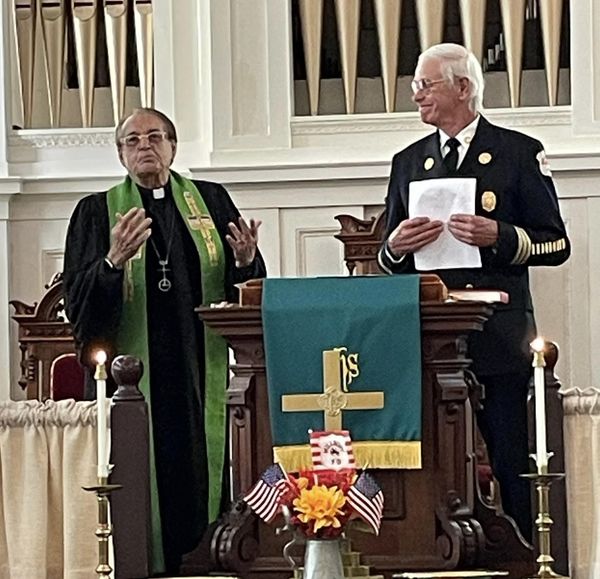Sermon 09 29 2024
by Rev Norman A Michaud
Have Salt in Yourselves Mark 9:38-50
A strong community enhances the lives of its members. Community is a
source of identity. People gain a sense of belonging and pride. Churches
often see themselves as “church families.” Often, a church family embodies
the community and we identify that community as meaningful and
formative. However, as with all families, churches may carry dysfunctions
and disagreements that fracture members. Past traumas and present
anxiety bring fears to the surface. Those who place politics or dogma
above relationships in our presently fractured society can break families
apart, including congregations or organizations.
A strong community may be so focused on itself that it loses the capacity to
relate to those outside. There is a constant tension between being inclusive
and being exclusive, with serious questions to be faced. How far should a
community go in relating to other people who are different? How long
should a church or organization survive when it excludes those who have
different standards, values, and customs?
The concern about inclusiveness and exclusiveness proves difficult for the
church. The church community is bound together not just by common
interest or mutual enjoyment, but by convictions about the issues of human
existence. What we believe most deeply, what gives value and meaning to
our existence is collective discernment.
Who are we? When we deal with such fundamental and significant issues,
it often becomes more difficult to be sensitive and accepting of those who
have different convictions.
The first followers of Jesus confronted this issue when they came across
someone who was casting out demons in Jesus’ name. They tried to stop
him “because he was not following us.” He was not one of “us,” one of their
group, and they wanted to keep the integrity of the way of Jesus and the
power of Jesus exclusive. What would happen if everybody started doing
anything in the name of Jesus? The disciples were averse to allowing
others outside their group to exercise healing power, even if it was for the
good cause of casting out demons.
When they told Jesus about the person, he did not share their concerns.
He said to them, “Do not stop him; for no one who does a deed of power in
my name will be able soon afterward to speak evil of me.” If good were
being done by others, Jesus considered those actions as positive. “For truly
I tell you, whoever gives you a cup of water to drink because you bear the
name of Christ will by no means lose the reward.”
Today, we celebrate the lives of our Millbury On Call firemen and women.
This includes the Ladies Auxiliary Millbury Fire Department Corp.
In 1968, my sister, Margaret gave me a book for Christmas. The book,
“Slaughter House Five, Or the Children’s Crusade” by Kurt Vonnegut Jr.
was the first book I read from cover to cover. That Christmas afternoon and
evening, I read it twice. It spoke to me about the futility of war. The novel
depicted Vonnegut’s experiences in World War Two during the Battle of the
Bulge. Vonnegut was taken prisoner by the Nazis within 200 yards of where
my father fought in the snow that Christmas. Vonnegut would survive the
bombing and destruction of Dresden, Germany, and the firestorm that
consumed that city. He survived with other prisoners by hiding in an unused
slaughterhouse. My dad did not become a prisoner, he was gravely
wounded by shrapnel and fought on. Only 26 members of his battalion
survived.
I became so enamored by “Slaughterhouse-Five” that I decided to read all
of his novels, most of which were included in the literary genre of Science
Fiction. In his early novel, “God Bless You, Mr. Rosewater,” he wrote about
firemen. Vonnegut himself was a volunteer fireman in the town of Alplaus,
New York, near Schenectady, New York, where he worked for GE. His
badge number was #155.
He wrote this: “I can think of no more stirring symbol of man’s humanity to
man than a fire engine.” Kurt Vonnegut always held firemen in the highest
regard, in his life and his art. In October 2001, after the terror attack on the
Twin Towers, the author joined others from his east-side Manhattan
neighborhood at a candlelight vigil in Dag Hammarskjold Plaza, New York
City, to remember those who had died in the Twin Towers from the local
firehouse, Engine Company 8, Ladder Company 2, Battalion 8. He spoke of
their dedication, service, and their demise.
Vonnegut recalled how men from that unit had saved his life less than two
years earlier when smoke and flames from an errant cigarette filled his
Turtle Bay townhouse. “Whether some who did that for me are dead now I
have not dared to ask,” he said, before solemnly reciting the list of names
of those since lost—ten in all. “Chief Tom DeAngelis, dead at fifty. Captain
Fred Ill, dead at forty-seven. Firefighter Mike Clarke, dead at twenty-seven,
the kid of the bunch….All but two left widows and children.”
Vonnegut’s identification with these civil servants was personal and deep-
rooted. References to their constancy, professionalism, and quiet heroics
are a theme running throughout his half-century of novels and stories.
Firemen symbolized for him the Midwestern ethic of neighborliness and
mutual aid he had learned growing up in Indianapolis. He referred to
firemen as a “band of brothers” who stood guard in firehouses in every city
and town across the country.
His admiration for firefighters as models of good citizenship makes sense.
He wrote, “When the alarm goes off, firemen are almost the only examples
of enthusiastic unselfishness to be seen in this land. They rush to the
rescue of any human being and do not count the cost. The most
contemptible man in town, should his contemptible house catch fire, will
see his enemies put the fire out. There we have people treasuring people
as people.”
Kurt Vonnegut kept in touch with the Alplaus firehouse to the end of his
life. When he died in April 2007, at eighty-four, its bell tolled a 5-5-5
cadence, the traditional salute to a fallen brother. Of all the tributes that
came forth from around the world for the celebrity writer, this is perhaps
the gesture he would have appreciated most.
At the end of the passage from Mark, Jesus speaks about salt, the qualities
that would preserve and enhance their community. Firemen represent the
“salt of the Earth.” Their courage comes from the salt that comes from
within in the form of courage and sacrifice. They come to the aid of citizens
without regard for them being insiders or outsiders. From all that Jesus said
as he journeyed the way to Jerusalem with his disciples, it becomes clear
that their saltiness involves being humble in their relationships with each
other, giving of themselves for others, reaching out, and accepting all the
people in need around them.


